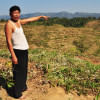Rising rubber production helping local tyre industry

Rising rubber production in Bangladesh is helping local tyre manufacturers cut the country's reliance on the imports of the product used in making bicycles, motorcycles, three-wheelers and easy bikes, said an industry insider.
According to the Bangladesh Rubber Board and producers, 67,939 tonnes of raw rubber were grown last year, up 58 per cent from 43,000 tonnes in 2021, driven by an increase in the number of gardens and acreages under cultivation.
Growers put the size of the local raw rubber market at Tk 1,020 crore. Both producers and processors are benefitting from the rising production.
"This is because growers can sell their produce while processors don't have to import raw rubber," said Luthful Bari, chief operating officer of Meghna Group, one of the major rubber users in the country, during an interview with The Daily Star on Saturday.
"The local production saves at least Tk 250 crore in foreign currencies every year."
Meghna Group's enterprise Meghna Innova Rubber Co Ltd, Hussain Tyre, and Gazi tyre are the major consumers of rubber in the country.
Meghna Innova Rubber needs 300 tonnes of semi-processed rubber a month to make tyres for bicycles, motorcycles and light commercial vehicles under the brand MTF, which is marketed at both local and export markets.
The company buys raw rubber mainly from state-run Bangladesh Forest Industries Development Corporation (BFIDC).
Bari said local manufacturers are capable of meeting 100 per cent demand for tyres used in bicycles, motorcycles, three-wheelers, easy bikes and light commercial vehicles. The country was dependent on the import of tyres for these segments only 12 years ago.
"Local manufacturers are producing world-class tyres as they have adopted sophisticated technologies at their manufacturing facilities."
Bangladesh still needs to buy tyres of trucks, buses and passenger cars from external markets.
Meghna Innova Rubber is going to start the manufacturing of tyres for commercial and passenger vehicles within a short time as its factory is ready to go into operation.
Bari also does not think that rubber farmers are not getting the expected price, saying the rate is determined on the basis of the prices in the international markets.
The BFIDC fixes the price twice a month.
He sought policy support from the government to develop and protect the local industry, citing the example of India.
"In India, tyre imports are prohibited as local manufacturers are capable of producing high-quality tyres. Global companies have also invested in the tyre industry in the neighbouring country."

 For all latest news, follow The Daily Star's Google News channel.
For all latest news, follow The Daily Star's Google News channel. 





Comments